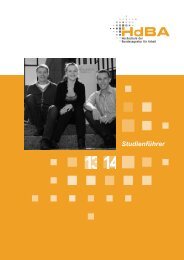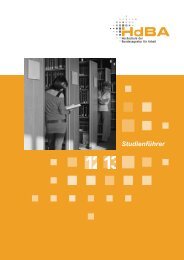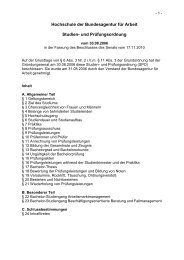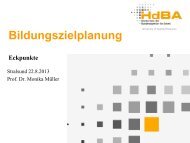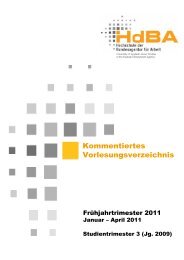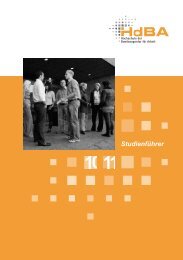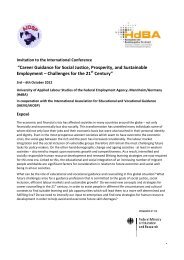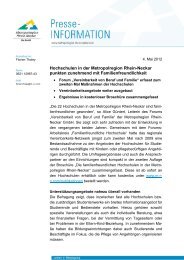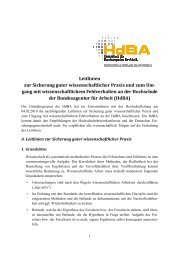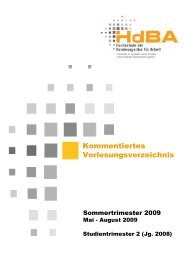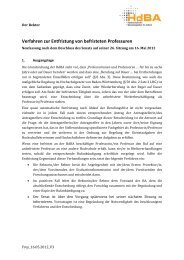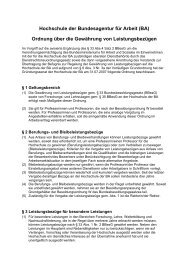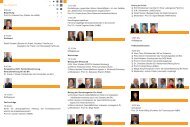Brain Drain - Hochschule der Bundesagentur für Arbeit
Brain Drain - Hochschule der Bundesagentur für Arbeit
Brain Drain - Hochschule der Bundesagentur für Arbeit
You also want an ePaper? Increase the reach of your titles
YUMPU automatically turns print PDFs into web optimized ePapers that Google loves.
�����������������������������������������<br />
���������������������������������������<br />
�<br />
�<br />
3.6 References<br />
Ausubel, D. P. (1960). Acculturative stress in mo<strong>der</strong>n Maori adolescence. Child<br />
Development.<br />
Berry, J. (1994). Acculturative stress. In: Psychology and culture. Allyn and Bacon.<br />
Bennett, M.J. (1993). Toward ethonorelativism: A development model of intercultural<br />
sensitivity. In: Education for the intercultural Experience.<br />
EIEM, 2004. Ethnic minorities in Europe – what’s the problem? Educational<br />
Integration of Ethnic Minorities Project, 9.7.2004.<br />
Hall, E.T. (1983), The Dance of Life. The Other Dimension of Time. Anchor<br />
Press/Doubleday, Garden City, NY.<br />
Launikari ,M.; Puukari, S. (2005) Multicultural Guidance and Counseling. Centre for<br />
International Mobility, Findland.<br />
Marx, E. (1998) Symptom of culture shock. London, EN.<br />
Ponterotto, J.G.; Pe<strong>der</strong>sen, P.B: (1993) Preventing prejudice: A guide for counsellors<br />
and educators. Newbury Park, CA.<br />
Sue, D.W. & Sue, D. (1999) (3rd Ed) Counselling the Culturally Different: Theory and<br />
Practice. New York: Wiley.<br />
Sue, D.W.; Arrendondon, P. and McDavis, R.J., (1995) Multicultural Counseling<br />
Competencies and Standards: a call to the profession. In Handbook of<br />
Multicultural Counseling, Ponterotto, J.G., Casas, J.M., Suzuki, L.A. and<br />
Alexan<strong>der</strong>, C. M., Thousand Oaks, California: Sage Publications.<br />
Sue, D.W.; Ivey, A.I., Pe<strong>der</strong>son, P.B. (1996) A Theory of Multicultural Counseling &<br />
Therapy. Pacific Grove:Brooks/Cole.<br />
4. Course 4: Living and Working Conditions in Selected Countries<br />
4.1 Learning Objectives<br />
• The BDBG counsellor knows main factors influencing living conditions – well<br />
being. (TAX 2 – foundation competences, client-interaction competences)<br />
• The BDBG counsellor knows and respects relevant legislation on working<br />
conditions. (TAX. 1 – foundation competences, client-interaction competences)<br />
• The BDBG counsellor is able to prepare for client tailored information on living and<br />
working conditions abroad (Tax 1 – client-interaction competences)<br />
• The BDBG counsellor is able to navigate clients among relevant information<br />
sources and show them how to use them. (Tax 3 – foundation competences,<br />
client-interaction competences)<br />
• The BDBG counsellor knows latest statistics and studies on living and working<br />
conditions in Europe and is able to estimate their development in the near future.<br />
(Tax 4 – foundation competences, client-interaction competences, supporting<br />
competences)<br />
86




